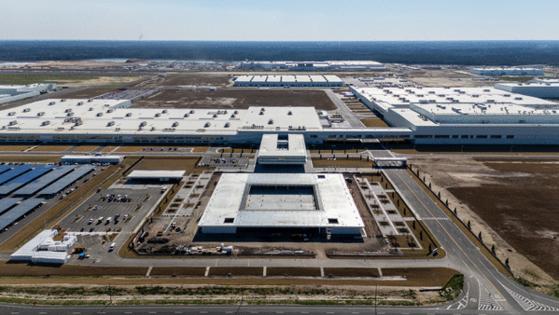How a raid turned Hyundai, Ga. Gov. Brian Kemp's biggest jobs push, into a political thicket
Published in News & Features
ATLANTA — When Gov. Brian Kemp announced a Hyundai Motor Group electric vehicle factory on a sandy site near Savannah in 2022, it was hailed as the largest economic development project in state history — and the centerpiece of his push to make Georgia the hub of U.S. EV manufacturing.
What started as a roughly $5.5 billion project soon grew to a proposed $7.6 billion investment and then to $12.6 billion when Korean giant LG Energy Solutions joined as a partner on an adjacent battery factory.
But last week’s federal immigration raid of the campus’ battery plant site, which led to 475 arrests, jolted both Georgia politics and U.S.-South Korea relations. The Bryan County plant, backed by about $2 billion in taxpayer-funded incentives, is under sharp new scrutiny.
The fallout is far from over — and the Hyundai raid could turn Kemp’s biggest economic development win into a liability.
Kemp has long defended the deal, slammed by critics for its 10-figure perks and its reliance on green energy tax breaks backed by President Joe Biden and targeted by President Donald Trump. Now, the crown jewel of Kemp’s economic agenda is drawing more fire from within the GOP.
U.S. Rep. Mike Collins of Jackson, a leading GOP Senate candidate, mocked Democratic U.S. Sen. Jon Ossoff’s support for the project, but didn’t mention Kemp. Awkwardly, an account backing former coach Derek Dooley — the Kemp-backed Senate contender — echoed the attack.
Kemp has tried to walk a fine line. Unlike other Republicans, he didn’t release a statement praising Trump’s crackdown. Instead, his office said “all companies operating within the state must follow the laws of Georgia and our nation.”
Hyundai pledged to move forward, and South Korean officials said about 300 of their citizens detained in the raid will be released and repatriated. The Korea Times reported late Sunday that Seoul and Washington are likely to review visa policies for foreign nationals with technical expertise in the wake of the raid.
The stakes go beyond Bryan County. Georgia is home to about 100 Korean-owned facilities employing 17,000 workers. South Korea is also the state’s third-largest trading partner at $17.5 billion a year. The governor has already made two trips there since he took office in 2019.
“Korea is not just a friend, but a key pillar of Georgia’s global economic strategy,” state economic development chief Pat Wilson wrote recently in The Atlanta Journal-Constitution.
Korean investments have reverberated across the state. Hyundai’s corporate cousin Kia operates its West Point factory where it makes the Telluride and Sorento SUVs. Georgia has also attracted a constellation of auto parts suppliers. SK Battery America operates a EV battery factory in Commerce, and related entity SK On and Hyundai are joint venture partners on a new battery plant under development in Bartow County.
The politics surrounding the raid and Trump’s immigration policies are only intensifying. While Hyundai’s investment in Bryan County promises to create thousands of jobs and a transformed community, it has also strained the local water system, clogged local roads and worsened the shortage of affordable housing. Union leaders complain local workers have been sidelined for foreign contractors.
Democrats like state Sen. Jason Esteves, meanwhile, are seizing on the raid to argue for tougher worker protections — a sign the fallout could reshape not just Kemp’s legacy, but the 2026 race for governor.
Esteves blasted the raid as a “politically motivated” move to bolster Trump while also saying state leaders must hold corporations accountable.
“When I’m governor, no corporation will get a blank check from my administration,” Esteves said. “I’ll strengthen worker protections, keep families safe, and fight against Trump’s political agenda.”
Incentive scrutiny
The raid has also raised questions about incentives offered to foreign companies, and in particular to Hyundai. The automaker has promised to eventually employ 8,500 workers across the site, including at the EV manufacturing plant, which is currently producing vehicles, and at the battery factory, which is under construction.
In the case of Hyundai, the state and a local development authority awarded the company a sweeping package of perks including property tax breaks, tax credits for newly created jobs, infrastructure improvements, a grant and a customized worker training program for employees.
In Georgia, temporary construction jobs don’t qualify for incentives, so workers building the Hyundai site don’t count toward the company’s job-creation goals. To claim tax credits, companies must file returns and provide documentation for newly created positions, the state Department of Economic Development said in a statement.
“Aside from long-term job-creation requirements stated in the economic development agreement, corporations set their timelines, not the state, and the state works with them to meet those goals,” the statement said.
In the wake of the raid, Hyundai brought in new management of the entire site, including the battery plant, which is being developed and will be operated under a subsidiary called HL-GA Battery Co.
Hyundai said Chris Susock, its North America chief manufacturing officer, will take over the project and the company “will conduct an investigation to ensure all suppliers and their subcontractors comply with all laws and regulations.”
“Hyundai is committed to full compliance with all laws and regulations in every market where we operate,” the statement said. “This includes employment verification requirements and immigration laws. We expect the same commitment from all our partners, suppliers, contractors, and subcontractors.”
The company said it will have zero tolerance for law violations.
“As we continue to invest in American manufacturing and create thousands of jobs, we will do so in full accordance with U.S. law and in a manner that reflects our values of treating all people with dignity and respect,” the company’s statement said.
_____
(Business editor J. Scott Trubey contributed to this report.)
_____
©2025 The Atlanta Journal-Constitution. Visit at ajc.com. Distributed by Tribune Content Agency, LLC.







Comments